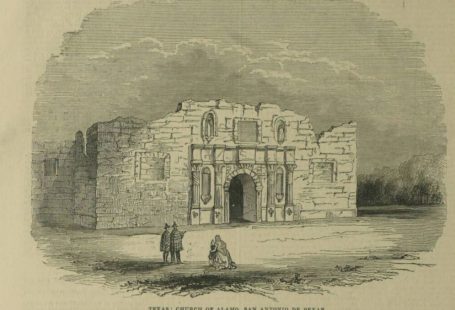Scottish missionary Jane Mathison Haining (6 June 1897 to 17 July 1944) was one of the only, if not the only, Scot to die during the course of the Holocaust, as she refused to leave her post in Budapest upon the outbreak of war and the subsequent invasion of Hungary by the Wehrmacht.
In this special blog, we will tell the story of Jane Haining, the quiet daughter of a farmer from Dumfriesshire, who was subsequently honoured as Righteous Among the Nations for risking her life to help the Jewish people during the Holocaust.
Want to learn more? Register now and explore The Archive
Early Life
Born in Dunscore, Dumfriesshire on 6 June 1897, the fifth child of farmer Thomas John Haining and Jane Mathison, Jane Haining’s academic ability was apparent from an early age when she won a scholarship to Dumfries Academy in 1909.
Meanwhile, our newspapers show a bright young pupil bursting with talent.
Dumfries Academy | Dundee Advertiser | 11 September 1897
For example, she performed in a ‘very successful concert‘ held in Crocketford in March 1915, the Dumfries and Galloway Standard noting that she gave a solo as part of the proceedings, singing ‘Bonnie Gallowa.’ She was also part of a group who performed in a sketch entitled ‘The Birth of the Union Jack.’
Two months later the same newspaper reports how Jane M. Haining, alongside other pupils at Dumfries Academy, had been awarded a certificate for ‘First aid and home nursing.’ It also details how she was living at Moat Hostel, where she stayed as a boarder.
Dumfries and Galloway Standard | 5 June 1915
But her biggest triumph at Dumfries Academy was to come at the end of June 1915, as the Dumfries and Galloway Standard reports:
We give below the prize lists of Dumfries Academy for the session which is about to close…The dux, on the modern side, is again a lady – Jane M. Haining, daughter of Thomas J. Haining, Lochanhead, Dunscore. She won in succession an Intermediate and a Secondary School bursary, and has attended the Academy for six years, and has been in residence in the Moat Hostel.
Jane was awarded the ‘prize for the dux of the modern side’ (dux meaning top pupil in a school or class), ‘according to the marks gained in the written examinations of the Sixth Class in English, history, mathematics, Latin, French, and German.’
Dumfries and Galloway Standard | 26 June 1915
Jane’s intellect and ability were clear, but what was next for the talented young woman?
Our newspapers fall silent regarding Jane as she entered the world of work, working as a secretary for thread manufacturers J. and P. Coats Ltd in Paisley for ten years. Then in 1927, she became interested in missionary work, gaining a qualification in domestic science and housekeeping from the Glasgow College of Life Science.
In 1932, after posts in Glasgow and Manchester, she applied for the job of matron at the Church of Scotland mission in Budapest.
Internment
From 1933 onwards Jane Haining worked as a matron of a girls’ school attached to the Church of Scotland mission in Budapest, also known as St Columba’s Church. The school consisted of approximately 400 girls, both Jewish and Christian, with some of the girls boarding at the school.
When war broke out in September 1939 Jane was on holiday in Cornwall, but she immediately returned to the school. As the situation deteriorated in Europe, and Jane was advised to leave, she remained at her post, even when Germany invaded Hungary in March 1944.
View of Budapest | The Sphere | 30 December 1944
From early April, a series of anti-Jewish laws were introduced in the country, with members of the Jewish faith required to wear yellow badges. Many Jews had fled to Budapest from other parts of Europe during the course of the Second World War, and as April progressed they and Jews native to the city were rounded up into ghettos. Soon the deportations to Auschwitz begun, with 12,000 Jews forcibly transported to the death camp every day.
Whilst it is thought that Jane Haining was denounced to the Gestapo in late April or early May (possibly after a disagreement with the school’s cook), news of this did not reach Britain until August. At this time, little was known in Britain about Auschwitz and the other death and concentration camps across Europe.
The Gloucester Citizen contains this brief report on 12 August 1944 under the headline ‘Missionary Interned:’
Miss Jane M. Haining, a Scottish missionary who refused to leave Budapest, where she was helping the Jews, has been sent to an internment camp in Upper Silesia.
Gloucester Citizen | 12 August 1944
Meanwhile, The Scotsman, 12 August 1944, goes into greater detail regarding Jane’s internment:
Through official sources the Church of Scotland Overseas Department recently received word that Miss Jane M. Haining, superintendent of the Girls’ Home in the Church of Scotland Mission, Budapest, Hungary, had been arrested. This action was taken early in May, following the taking over of Hungary by the Germans. Further news has now been received that Miss Haining has been sent to an internment camp for women at Auschwitz.
The article notes how the Scottish Mission in Budapest had been running with success for 104 years, and, tellingly, how ‘When the Rev. George A.F. Knight B.D…was compelled to return home, Miss Haining insisted on staying to do what she could.’
Soviet troops fighting in Budapest | The Sphere | 20 January 1945
Jane would not abandon her post, and the girls for whom she cared. The Scotsman reports on how ‘much was done to save many Hungarian Jews from the full consequences of the anti-Semitic measures which had been enacted’ at the mission, and how this work was continuing after Jane’s internment.
‘Courage and Devotion to Duty’
In the Dumfries and Galloway Standard this short announcement appeared under the ‘Deaths’ column on 26 August 1944:
HAINING. – On 17th July, 1944, died in hospital in Germany, Jane Mathieson Haining, third daughter of the late Thomas John and Jane Haining, of Lochenhead, Dunscore, aged 47 years.
Dumfries and Galloway Standard | 26 August 1944
This was the obituary of Jane Haining, after a death certificate bearing her name arrived in Edinburgh on 17 August 1944, soon after the news of her internment had reached Britain. Testament to the disinformation prevalent at the time, it was thought that Jane had died in Germany, in hospital, but it is more than likely that she in fact died in Auschwitz, from complications arising from starvation and malnutrition.
On the 30 August 1944, the Dumfries and Galloway Standard expanded on the brief and tragic notice:
The Jewish Mission Committee of the Church of Scotland has now received official word that Miss Jane M. Haining, who was recently reported as having been interned by the Germans at Auschwitz in Upper Silesia, died in hospital on July 17th.
Dumfries and Galloway Standard | 30 August 1944
It is possible that Jane died in hospital in Auschwitz, but again, little is known about the circumstances of her death, and at that time in Britain few knew about the atrocities being committed across Europe by the Nazi regime.
The Dumfries and Galloway Standard goes on to pay tribute to her work at the mission in Budapest:
Miss Haining was appointed to the Mission in Hungary in 1932 and rapidly made a deep impression on the girls under her supervision. She was also exceedingly popular with the Hungarian members of staff, whose parents were specially appreciative of her work and influence.
The article furthermore reports how:
Her courage and devotion to duty were such that, when others left Hungary, she decided to remain at her post. The news of her death has caused great regret in mission circles and among her former business friends.
Jane’s courage and devotion were honoured just as the news came through of her tragic death, and it would be honoured again throughout the following decades.
‘Deep Regret and Admiration’
Weeks after the news of Jane’s death broke, she was being remembered in a variety of ways.
One Rev. Mr. Crabb ‘made fitting reference to the death of Miss Jane Haining’ during a sermon conducted in September 1944, as the Dumfries and Galloway Standard reports:
She was a former pupil of Dumfries Academy. Miss Haining elected to remain in the city, and she was ultimately put into a concentration camp. What happened to her after that was not known. He was sure the Presbytery would join in expressing deep regret and admiration for her faithful service.
Furthermore, a memorial service was held for her at St. George’s West Church, Edinburgh, on the 28 September 1944. The Scotsman features the below announcement:
Miss Jane M. Haining of Budapest – A Memorial Service will be held in St. George’s West Church, Shandwick Place, Edinburgh, on Thursday, 28th September, at 2.0pm. All interested are cordially invited.
With the end of the war, and the eventual liberation of the concentration camps, Jane Haining’s name does not appear in our newspapers. But she was not forgotten.
The concentration camp at Dachau is repurposed for refugees | The Sphere | 12 November 1949
At a meeting of the St. David’s Woman’s Guild in January 1956, Mrs. Mackenzie, ‘the Jewish Mission delegate’ gave an ‘eloquent and interesting resumé of the life and work of Miss Jane Haining.’ The West Lothian Courier reports how:
Miss Haining was one of the most devout and talented women ever to serve with the Church of Scotland Jewish Mission and the ladies listened with sympathetic appreciation to her story.
Meanwhile in 1988 Jane Haining was again remembered, with the publication of a book called A Legacy of Scots by Charles Walker. The Aberdeen Evening Express, 28 September 1988, details how:
The book is actually dedicated to a Dumfriesshire girl who died in Auschwitz, the only Scot to be killed in a concentration camp. Her only offence was to help others, for Jane Haining ran a Church of Scotland mission school for Jewish girls in Budapest.
Greater honours, however, were in store for Jane and her legacy of courage and devotion in the face of the greatest of adversities.
Righteous Among the Nations
In December 1997, the Aberdeen Press and Journal reported on an ‘Israeli Honour for Scot:’
A Church of Scotland girls’ home matron who died in Auschwitz is to be honoured today in a ceremony by Israeli remembrance authorities. Israel’s ambassador to Britain, Moshe Raviv, is to present a medal to the sister of Jane Haining, the first time the honour has been awarded to a Scot.
Jane Haining was to be honoured as Righteous Among the Nations by Yad Vashem, Israel’s memorial to the victims of the Holocaust, her name featured in the Garden of the Righteous in Jerusalem. This honour is for non-Jews who risked their lives to help Jews throughout the time of the Holocaust.
Aberdeen Press and Journal | 8 December 1997
In attendance at the ceremony held at Glasgow’s Museum of Religious Life were senior figures from the Church of Scotland, including the Rt. Rev. Sandy McDonald, as well as Jane’s own sister Agnes O’Brien.
Agnes, aged 75, told the press how:
I am very proud and honoured that Jane is being honoured in this way.
Meanwhile, Jane was honoured in the city that she had refused to leave. At a service in Budapest in February 1999 a wreath was laid ‘in tribute to Jane’ by the Rt. Rev. Alan Main, as reported the Aberdeen Press and Journal. Also in February 1999, the Daily Mirror recognized ‘Scotswoman Jane Haining [as] a heroine.’
Aberdeen Press and Journal | 15 February 1999
Further memorials to Jane include plaques at the Church of Scotland mission in Budapest and at her former school Dumfries Academy, a cairn near Dunscore Church, and finally the Jane Haining rakpart (Jane Haining quay) in Budapest, named for her in 2010.
Our newspapers, too, provide a fitting memorial to Jane Haining, as they trace her legacy, from her successful schooldays through to her internment and tragic death, meaning that she is not forgotten, and can be remembered as one of the millions who lost their lives during the Second World War in the absolute atrocity which was the Holocaust.
A cross marks the spot of the furnaces at Auschwitz | Daily Mirror | 25 January 1960



















